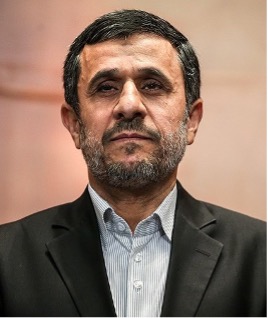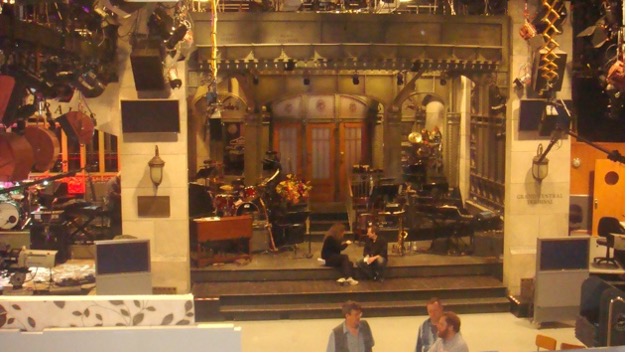“I know you say there’s no gays in Iran, but you’re in New York now, baby!”
In 2007 Mahmoud Ahmadinejad, then the president of Iran, claimed in a speech given at New York City’s Columbia University that there were no gay people living in Iran and he also continued to claim that the Holocaust was a myth. Both claims represent a form of verbal violence which is closely connected to physical violence and conflict, past, present and future.
Predictably, his speech caused considerable backlash and controversy, which caught the attention of the New York-based sketch comedy show Saturday Night Live. The sketch produced addressing Ahmadinejad’s comments came in the form of a song by The Lonely Island, a sketch and songwriting group formed of childhood friends Andy Samberg, Akiva Schaffer, and Jorma Taccone. The group, already well-known for their surreal and absurd sketches, chose to make this sketch devoid of any aimed political points typical of SNL. Instead, they wrote a generic late 2000s song about a man who, against all odds, has fallen in love with Mahmoud Ahmadinejad. He details in Andy Samberg’s trademark pseudo-rap how he fell in love with the president and what he means to him, with pop culture jokes throughout.

The song makes effective use of the irony of its premise and lyrics. The image of Ahmadinejad, despite his homophobic and antisemitic comments, going on dates in New York City with a gay protagonist played by Andy Samberg, a Jewish actor, is itself comedic. The song makes frequent reference to this discrepancy: at the beginning of the song, Samberg recounts how he “saw you [Ahmadinejad] on the news/You were hatin’ gays/I was eatin’ food”, but despite their differences “you ain’t wrong to me.” Samberg goes on to compare Ahmadinejad to “a very hairy Jake Gyllenhaal”. Later in the song in a very loaded reference, Samberg tells Ahmadinejad that “you can play the Jews, I can be your Jim Caviezel,” referencing both Ahmadinejad’s alleged torture tactics in Iranian prisons and The Passion of the Christ. Samberg expresses a blasé attitude toward Ahmadinejad’s policy on nuclear weapons as well, proclaiming, “nuclear threat, the only threat I see/Is the threat of you not coming home with me,” going on a few lines later to compare his love to atoms colliding, the process that occurs within a nuclear weapon.

The comedic impact of these references is increased by the style of the video. Samberg makes frequent references to other music videos of the time, including playing a piano on the streets of New York (a reference to Jay-Z and Alicia Keys’s famous “Empire State of Mind” music video) and featuring a children’s choir in one repetition of the chorus, which has been common in pop songs for decades and was used prominently in one of the hit songs of the same year, M.I.A.’s “Paper Planes”. Adam Levine, a major pop singer at the time, is also featured in the song and video. These recognizable images, sounds, and faces lend an air of authenticity to the song and make it funnier to remember that the song is an ode to the controversial president of Iran. (On the political impact of music videos more generally, see this great article by Catherine Baker.)
These aspects come together to create a take on politics which allows us to laugh and, for a moment, to suspend engagement with the darker side of the ideological and geopolitical conflicts that lie at the heart of Ahmadinejad’s speech. Had the song been more on the nose with its politics, it might have come across as preachy or as too dour. Any less political engagement, and it would be at best unrelated to current events and at worst distracting from Ahmadinejad’s dangerous comments. The sketch strikes a balance, allowing us to laugh at the absurdity of its premise without forgetting the man the song is addressed to and the dangerous power of his toxic claims.
How can this comic music video help us think about peace and peace-building? In some cases, peace is found in the cessation of violence. In others, it is more than that: it is the ability to reconcile people and perhaps also to change minds and overcome the violence of words and deeds. While this sketch might appear at first glance as a frivolous take on a serious issue, it actually combines aspects of both cessation and persuasion. Its humour temporarily neutralises Ahmadinejad’s toxic rhetoric, giving listeners a moment to laugh at it without worrying about how to tackle the verbal violence or change his followers’ minds. In turn, that moment of respite from the conflict of words and beliefs which Ahmadinejad’s speech was designed to stoke offers us a valid option for future engagement (or non-engagement), showing us how we can address violent words without legitimising them as viewpoints to be taken seriously. Satire has a lot to offer as a peace-building tool, because it can change the balance of power between speakers and audiences, politicians and citizens, oppressors and the oppressed. It also helps to reframe violent viewpoints from different perspectives; and through recurring references to other forms of satire and popular culture, it also builds a sense of community around common reference-points, while exposing absurdity. A form of soft power itself, satire has been used throughout history to call attention to abuses of power and to blunt the swords of leaders intent on oppressing others and perpetuating conflicts.
What do you think?
- Is it reductive to poke fun at political leaders or political viewpoints? What are the risks alongside the benefits?
- Does comedy/satire tend to be radical or reactionary? Does it change people’s minds or confirm what its audiences already think?
- How can comedy best contribute to inner peace or geopolitical peace?
- Can you think of other examples of satire that you might call ‘peace-building’?
If you enjoyed this item in our museum…
You might also enjoy Dad’s Army: Pockets of Peace and Humour?, Pride, To Be or Not To Be, and other items the ‘Artivism‘ tag.
Arden Henley, December 2022